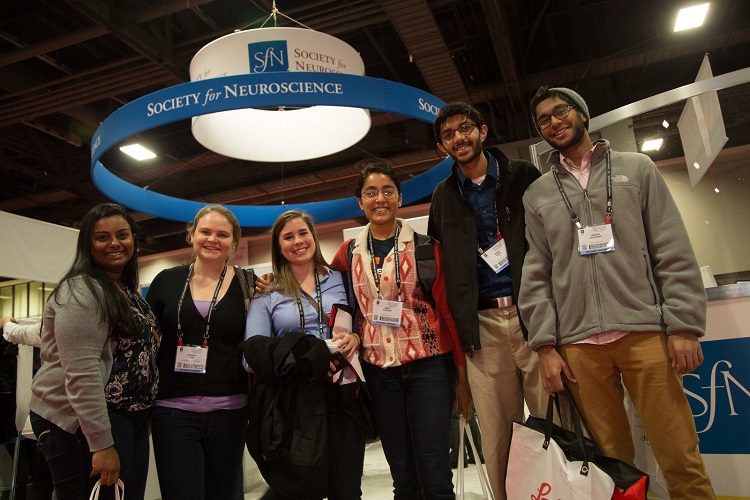
Q&A: Highlighting the Benefits of Global Collaboration
SfN’s Council members from outside the U.S. share their perspectives on the importance of global collaboration in advancing the scientific enterprise around the world and how SfN supports these efforts. In addition to serving as a councilor, Barry Everitt is president of the Federation of European Neuroscience Societies (FENS), and provost of the Gates Cambridge Trust and director of research at the University of Cambridge in the U.K. SfN Treasurer Freda Miller is a developmental neurobiologist at the Hospital for Sick Children Research Institute and a professor at the University of Toronto. Councilor Magda Giordano is an investigator and chair of the Department of Behavioral and Cognitive Neurobiology at the Universidad Nacional Autónoma de México.
How does SfN encourage diversity and international collaboration in the field through its programming and why is it important that the Society is a leader in this area?
 Freda Miller: From its inception, SfN has embraced the concept of internationalism in science. Early on, SfN recognized the importance of global collaboration and specifically sought involvement from neuroscientists in Canada and Mexico. Since that early beginning, it has become a truly global scientific membership organization devoted to promoting the well-being of neuroscience and neuroscientists everywhere. Over the past several decades, SfN has worked to acknowledge its increasingly global membership in a number of ways. First, SfN has acted to ensure the inclusion of international members on the SfN Council and on all of its committees. Second, all of SfN's many programs are available to all of its members, regardless of where they live. As one example, SfN member-initiated chapters have been established around the world, with more than 150 chapters in dozens of countries. As a second example, SfN has been rapidly establishing many new web-based initiatives with the idea that digital activities allow members to participate more easily regardless of where they are located. Finally, SfN has recognized that some programs need to be "personalized" for different countries. Perhaps the best example of this involves advocacy — what works for one political context will not necessarily work for another. In recognition of this, the Canadian Association for Neuroscience partnered with SfN to support activities like hiring an advocacy officer and engaging in efforts to speak directly with politicians in Ottawa.
Freda Miller: From its inception, SfN has embraced the concept of internationalism in science. Early on, SfN recognized the importance of global collaboration and specifically sought involvement from neuroscientists in Canada and Mexico. Since that early beginning, it has become a truly global scientific membership organization devoted to promoting the well-being of neuroscience and neuroscientists everywhere. Over the past several decades, SfN has worked to acknowledge its increasingly global membership in a number of ways. First, SfN has acted to ensure the inclusion of international members on the SfN Council and on all of its committees. Second, all of SfN's many programs are available to all of its members, regardless of where they live. As one example, SfN member-initiated chapters have been established around the world, with more than 150 chapters in dozens of countries. As a second example, SfN has been rapidly establishing many new web-based initiatives with the idea that digital activities allow members to participate more easily regardless of where they are located. Finally, SfN has recognized that some programs need to be "personalized" for different countries. Perhaps the best example of this involves advocacy — what works for one political context will not necessarily work for another. In recognition of this, the Canadian Association for Neuroscience partnered with SfN to support activities like hiring an advocacy officer and engaging in efforts to speak directly with politicians in Ottawa.
I believe that SfN's efforts to promote the excellence of neuroscience and the well-being of neuroscientists worldwide provides a model for all of us. As scientists, we are in the privileged position of having worked and collaborated in a truly global enterprise and, because of this, we understand the value of internationalism. As a consequence, I think it is our responsibility to promote global collaboration and diversity, particularly when these values are challenged societally.
With attendees from nearly 80 countries, SfN’s annual meeting serves as a hub for global scientific exchange in the field of neuroscience. Why is it important for the international neuroscience community to have such a venue for in-person discussion and collaboration?
 Barry Everitt: The annual meeting provides a venue at which all areas of neuroscience research are represented; it has always been a meeting of bewildering breadth, depth, and numbers. Leaders in their fields as well as young researchers — postdocs and graduate students — attend, the latter in ever greater numbers. And although SfN was initially established as a mostly U.S.-based society, its membership and attendance at its annual meeting are truly international. The meeting therefore provides an opportunity to engage with cutting-edge research by those doing it and thereby opening the doors to both intellectual and research collaboration; this has been of undoubted importance to my own research for as long as I have been attending SfN (and, yes, I do have my 25 year badge!). While electronic communication is world-shrinking, there is no substitute for this opportunity for in-person, in-depth discussion that frequently leads to significant collaboration. It is impossible not to mention that in the current context, when free movement of individuals is under threat both in the U.S. and Europe, that every effort is made to ensure that the annual meeting is one that all neuroscientists, regardless of where they are from, can attend, thereby ensuring that scientific discourse and interaction are strengthened, not weakened, and supporting global collaboration in the future.
Barry Everitt: The annual meeting provides a venue at which all areas of neuroscience research are represented; it has always been a meeting of bewildering breadth, depth, and numbers. Leaders in their fields as well as young researchers — postdocs and graduate students — attend, the latter in ever greater numbers. And although SfN was initially established as a mostly U.S.-based society, its membership and attendance at its annual meeting are truly international. The meeting therefore provides an opportunity to engage with cutting-edge research by those doing it and thereby opening the doors to both intellectual and research collaboration; this has been of undoubted importance to my own research for as long as I have been attending SfN (and, yes, I do have my 25 year badge!). While electronic communication is world-shrinking, there is no substitute for this opportunity for in-person, in-depth discussion that frequently leads to significant collaboration. It is impossible not to mention that in the current context, when free movement of individuals is under threat both in the U.S. and Europe, that every effort is made to ensure that the annual meeting is one that all neuroscientists, regardless of where they are from, can attend, thereby ensuring that scientific discourse and interaction are strengthened, not weakened, and supporting global collaboration in the future.
SfN’s Council and committees include neuroscientists from around the world and with a diversity of backgrounds. How do both SfN and the field of neuroscience benefit from the Society maintaining a diverse leadership?
 Magda Giordano: The Society for Neuroscience is, I believe, the most important international society in its field. The meetings of the Society are attended by students and faculty from all over the world. For international graduate students coming to the meeting is sort of a rite of passage. They give their first talk at the meeting, encounter the authors of papers and books they have read, and may even interact with them. It is a place where a new job may be found, new collaborations established, new research lines may be started. These opportunities are uncommon in other venues, and in their home countries they may be very rare. It is fitting that the leadership of the Society include neuroscientists from around the world because the specific situations and needs of international students and faculty need to be known and understood so that the Society can continue to fulfill its role as a promotor of neuroscience research and training for everyone. Knowing the situation of neuroscience in the international community is useful to select the appropriate themes for training programs and develop resources that may be needed. Having a diverse leadership helps also to find common ground, to find novel solutions to difficult problems, and brings a different perspective to the table.
Magda Giordano: The Society for Neuroscience is, I believe, the most important international society in its field. The meetings of the Society are attended by students and faculty from all over the world. For international graduate students coming to the meeting is sort of a rite of passage. They give their first talk at the meeting, encounter the authors of papers and books they have read, and may even interact with them. It is a place where a new job may be found, new collaborations established, new research lines may be started. These opportunities are uncommon in other venues, and in their home countries they may be very rare. It is fitting that the leadership of the Society include neuroscientists from around the world because the specific situations and needs of international students and faculty need to be known and understood so that the Society can continue to fulfill its role as a promotor of neuroscience research and training for everyone. Knowing the situation of neuroscience in the international community is useful to select the appropriate themes for training programs and develop resources that may be needed. Having a diverse leadership helps also to find common ground, to find novel solutions to difficult problems, and brings a different perspective to the table.
How have global collaborations influenced both your own career and neuroscience research within your country?
Freda Miller: With regard to my own career, I view myself, first and foremost, as a neuroscientist, without a national identity attached to that word. As scientists, we are fortunate to live and work in a field that is truly international, and where excellence and innovation are valued regardless of what country a scientist is born in or where they are working. I personally have benefitted tremendously from this global outlook, interacting with and collaborating with scientists throughout the world. In fact, when students ask me about pursuing a career in science, I highlight the international nature of research as one of the most positive aspects of being a scientist.
I also believe that these comments can be generalized to the broad Canadian neuroscience community. Canadian neuroscientists collaborate with scientists worldwide who share similar scientific interests. Moreover, we in Canada have benefitted tremendously from the many international scientists who have chosen to pursue science here in Canada. Canada is a country that has been built by immigrants, and our scientific community is a reflection of that. We would be a much poorer community, both professionally and personally, without these close global ties.
Barry Everitt: Global collaborations have enabled me and the researchers working with me over many years to undertake multidisciplinary projects that would not otherwise have been possible — or very much more difficult — in any of the single labs involved. For example, a Human Frontier Science Program project brought a Cambridge group together with groups in Amsterdam and Tucson, Ariz., and the annual SfN meeting provided an optimal venue to plan experiments and discuss data. Research collaboration and intellectual interaction with my many colleagues and friends in the U.S., especially but not only at the National Institute on Drug Abuse, at the annual meeting enrich my research and theoretical approach to it on an annual basis.
I cannot speak for my country, but casual observation of the networking of U.K. and European neuroscientists with U.S. and other colleagues at SfN, together with the obvious evidence of joint published outputs, make the influence of global collaboration apparent. But I am also in the unusual — in fact, unique — position of being both an international member of SfN Council and also president of the Federation of European Neuroscience Societies (FENS), so there is an additional, extremely important collaboration between the U.S. and Europe neuroscience in particular concerning advocacy and training. For example, the animals in research committees of both SfN and FENS have a very close relationship and work hard and effectively to promote and protect neuroscience research involving animals across the U.K. and Europe and, indeed, much further afield. SfN collaborates with FENS in supporting a highly successful summer school held in Europe each year. There is much more that could be done and SfN-FENS are holding detailed discussions — to be continued in depth at the 2017 annual meeting — about how to deepen this collaboration to the future benefit of global neuroscience.
Magda Giordano: Having global collaborations has directly helped my research in very concrete ways — from giving me access to materials, animals, cells lines, to thinking about new ideas and starting a new line of research. I cannot picture my life as a researcher without international collaborations. The influence of these collaborations was present from the moment my undergraduate thesis adviser suggested I work with a researcher that he knew. When I finished my academic training, after my postdoc, I brought with me the cell lines I developed as part of my postdoctoral training, and thus I could continue my research. As part of a sabbatical year, I started a new line of research with new collaborators, with whom I hope to continue working for the foreseeable future.
In terms of the influence of collaborations within my country, neuroscientists are a small community. Some research areas have been developed for several decades, but many research areas include very few scientists, so when selecting candidates for a position, when granting funds, when reviewing papers from new research areas, we depend on international collaborators to lend us a hand in making unbiased decisions. Additionally, international collaborations are very important for the continuing education of our graduate students since a postdoctoral stay is a requirement for hiring in our research institutions. Finally, collaborations increase productivity. It has been found that the more productive researchers are those who maintain their collaborations. So, from promoting the training of individuals to increasing productivity, international collaborations have a wide influence within my country.






















